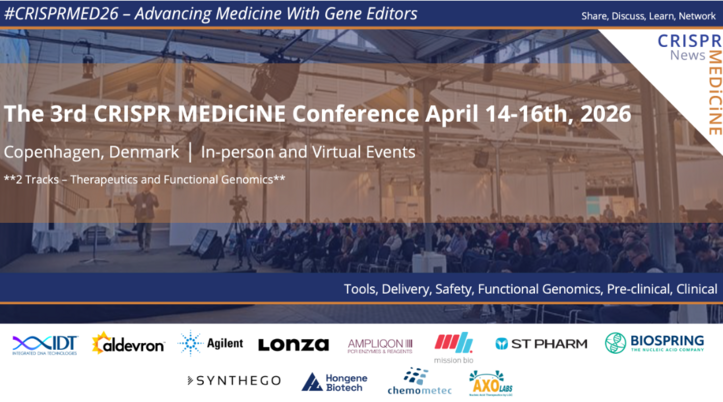CMN Weekly (12 April 2024) - Your Weekly CRISPR Medicine News
By: Karen O'Hanlon Cohrt - Apr. 12, 2024
Top picks
- Researchers in the US, Japan and the UK report in Nature Biotechnology that genome editing with Cas9 and adeno-associated virus repair templates leads to frequent insertion of viral vectors that are difficult to detect, and that these events occur regardless of locus, vector concentration, cell line or cell type. The team presents strategies to detect and characterise the concatemeric viral vector insertions, as well as strategies to prevent their occurrence by cutting the vector genome after transduction.
Research
- In an article published in Cancer Discovery, scientists at various institutions in the US (including CRISPR Therapeutics), Australia, Netherlands and Switzerland report pre-clinical data for CRISPR Therapeutic's candidate CTX130 for renal cell carcinoma (RCC), which showed favourable proliferation and cytotoxicity profiles and completely regressed RCC xenograft tumours. The article also contains clinical data from 16 patients with relapsed or refractory clear cell RCC who received CTX130 in a Phase I, multicenter, first-in-human clinical trial. No patients encountered dose-limiting toxicity, and disease control was achieved in 81.3% of patients. One patient remains in a durable complete response at 3 years. The article also includes details of a next-generation CAR T construct, CTX131, in which synergistic potency edits to CTX130 confer improved expansion and efficacy in pre-clinical studies. Read more about CTX130 and RCC in a previous clinical trial update here.
- In an article published in Advanced Science, researchers in Japan report the construction of functional zinc finger nucleases (ZFNs) and the improvement of their genome-editing efficiencies using three structural modelling programmes: AlphaFold, Coot, and Rosetta. The team assembled plasmids encoding ZFNs that consisted of six fingers using publicly available zinc-finger resources, and obtained two functional ZFNs through their efforts. The team reports that the engineering of ZFNs using AlphaFold, Coot, or Rosetta increased the efficiency of genome editing by 5%, demonstrating the effectiveness of engineering ZFNs based on structural modelling.
- The human PAH gene encodes the hepatic enzyme phenylalanine hydroxylase (PAH), and its deficiency, known as phenylketonuria (PKU), leads to dangerously high levels of phenylalanine in the brain. PAH exon 11 is weakly defined, and several missense and intronic variants identified in patients affect the splicing process. In an article published in Nucleic Acid Therapeutics, a team in Spain and Denmark build upon their previous work - that identified a novel intron 11 splicing regulatory element - to describe an antisense strategy targeting intron 11 sequences to correct the effect of PAH mis-splicing variants. The team used an in vitro assay with minigenes and identified splice-switching antisense oligonucleotides (SSOs) that correct the exon skipping defect of certain PAH variants. They found that CRISPR-Cas-mediated introduction of those variants in a hepatoma cell line reproduced the exon 11 skipping pattern observed from minigenes, leading to reduced PAH protein levels and activity.
Industry
- Nvelop Therapeutics launched earlier this week with dual platforms for in vivo delivery of genetic medicines using programmable, non-viral delivery approaches. The company is co-founded by David Liu and Keith Joung, and led by CEO Jeff Walsh and CSO Melissa Bonner. Read more here.
- Cellectis announced yesterday the publication of a new research article in Molecular Therapy, demonstrating that TALEN-mediated intron editing of haematopoietic stem and progenitor cells (HSPCs) allows transgene expression that is restricted to the myeloid lineage. The company states in its press release that this approach could unlock new therapeutic routes for the treatment of inborn metabolic diseases as well as neurological diseases that require delivery of therapeutics to the brain.
- Allogene Therapeutics announced this week that it will participate in four investor conferences in the second half of 2024. See the official press release for further details.
- Epic Bio announced this week that it will present three oral presentations and three poster presentations at the upcoming Annual Meeting of the American Society of Gene & Cell Therapy (ASGCT), taking place next month in Maryland, Baltimore. Epic Bio's pipeline includes programmes for several rare diseases as well as cancer, leveraging the company's epigenetic editing technology. According to the press release, the company plans to initiate dosing patients in a clinical trial of its lead programme, EPI-321, for the treatment of facioscapulohumeral muscular dystrophy (FSHD) in 2024.
- Poseida Therapeutics presented new Phase 1 data from the P-BCMA-ALLO1 trial at the American Association for Cancer Research (AACR) Annual Meeting which took place in San Diego this week. The data, which is summarised in a press release, demonstrates the potential of P-BCMA-ALLO1 allogeneic CAR-T therapy to benefit a broad panel of patients with multiple myeloma. BCMA-ALLO1, which is is Poseida's lead candidate, is a fully allogeneic, T stem cell memory (TSCM)-rich CAR-T candidate that is engineered to target the B cell maturation antigen. This antigen is primarily expressed by malignant and normal plasma cells and by some mature B cells, and is the most widely studied target in CAR-T-based approaches to MM. Read more about BCMA-ALLO1 in our recent clinical trial update here.
- Excision BioTherapeutics announced yesterday that it will present three oral presentations and three poster presentations at the upcoming ASGCT annual meeting. According to the company's press release, the presentations are related to new data for its emerging pre-clinical programmes for herpes simplex virus-1 keratitis and hepatitis B virus (HBV), as well as an overview of a novel AAV delivery vector. The presentations will also include an update on the ongoing first-in-human study of EBT-101 for HIV.
- HuidaGene Therapeutics announced this week that it has had 16 abstracts accepted for the upcoming ASGCT annual meeting. The presentations, which include seven oral presentations, will focus on HuidaGene's central nervous system, ophthalmology, and neuro-myology programmes and its technology platforms, which according to the company's press release showcase the strength and potential of its DNA-, RNA-, and base-editing technologies to treat fatal neurological diseases and hard-to-treat retinal diseases.
- Tome Biosciences announced this week that it has secured a US patent for Integrase-Mediated Programmable Genomic Integration (PGI). This patent protects Tome’s foundational PGI technology, integrase-mediated PGI (I-PGI), describes a system capable of performing I-PGI in a mammalian cell, and is exclusively licensed to Tome from MIT. Read the press release for further details.
- GenEditBio has announced USD $10 million in Pre-A+ funding. According to a LinkedIn post by the company this week, the new funding will greatly accelerate the company's plans to advance its genome-editing technology platforms, including new Cas nuclease discovery and safe and efficient cargo delivery based on LNPs and ePDVs (engineered protein delivery vehicles). See the official press release (in Chinese) for further details.
- CRISPR-Cas3 tech company C4U (Japan) and Sumitomo Pharma (Japan) have entered a licence agreement that will grant Sumitomo Pharma the right to develop and market regenerative medicine products for central nervous system diseases using CRISPR-Cas3 technology.
- Century Therapeutics announced yesterday that it was expanding its pipeline with the support of $60 million in private placement as well as via the acquisition of Clade Therapeutics. According to its press release, Century is pursuing additional autoimmune disease regulatory filings for its iPSC-derived natural killer (NK) cell therapy, CNTY-101, beyond the planned CALiPSO-1 trial in systemic lupus erythematosus, based on the potential of its differentiated profile. CNTY-101, which is currently being evaluated in the ELiPSE-1 trial in B-cell malignancies, is a CD19-targeting allogeneic iNK cell therapy with 6 precision gene edits powered by Century’s Allo-EvasionTM technology, which enables repeat dosing without the need for continued lymphodepletion.
Reviews
- Traditional and emerging strategies using hepatocytes for pancreatic regenerative medicine. This review article looks at the traditional and emerging strategies (including CRISPR-Cas9) involving the use of hepatocytes for pancreatic regenerative medicine and evaluates their advantages and challenges.
- CRISPR and Gene Editing: A Game-Changer in Drug Development. This review explores the diverse impact of CRISPR across various medical domains, including hereditary diseases, infectious diseases and cancer. The authors highlight the potential of CRISPR in personalised medicine, therapeutic innovation, and pandemic prevention, along with its role in reshaping traditional drug development processes.
- CRISPR-Cas System: A New Dawn to Combat Antibiotic Resistance. This review article provides an overview of the mechanisms by which antimicrobial resistance may occur, and investigates the potential of CRISPR-based strategies to combat bacterial antimicrobial resistance.
Detection
- In an article published this week in Biosensors and Bioelectronics, scientists in China describe a sensitive and selective CRISPR-Cas12-based assay for the detection of Fat mass and obesity-associated protein (FTO). Variants of the FTO gene have been associated with increased risk of developing obesity. In simple terms, when present, the FTO protein removes the m6A modification on the catalytic core of DNAzyme, restoring its cleavage activity and generating so-called activator DNA, all of which are added to the assay pot. The activator DNA further activates the trans-cleavage ability of Cas12a, leading to the cleavage of a single-stranded ferrocene-tagged (ssDNA-Fc) probe, and the subsequent emission of a measurable electrochemiluminescence (ECL) signal.
- Scientists in China report a centrifugal microfluidic chip integrated with a recombinase-aided amplification (RAA)-CRISPR system to achieve rapid detection of bacterial respiratory tract pathogens. The assay was developed as a seamless one-step workflow which the researchers claim enhances the accuracy and sensitivity of bacterial detection, and was designed to simultaneously detect multiple respiratory pathogens. When tested in a clinical setting, the assay could accurately detect 12 common respiratory bacterial pathogens within a set of 60 clinical samples. The findings were published in Analytical Chemistry.
News from CRISPR Medicine News
- Our latest clinical trial update includes news from Caribou Biosciences, which is expanding its clinical programme for CB-010 into lupus, Verve Therapeutics, which has pause the ongoing clinical trial of VERVE-101 following a treatment-related adverse event, and iECURE, which has received FDA clearance to begin trial of ECUR-506 in ornithine transcarbamylase deficiency. Read the update here.
To get more CRISPR Medicine News delivered to your inbox, sign up to the free weekly CMN Newsletter here.
Tags
ArticleMissing linksNewsCMN WeeklyAllogene Therapeutics, Inc.C4UCellectis S.A.CRISPR Therapeutics AGEpic BioExcision BioTherapeuticsGenEditBioHuidaGene TherapeuticsNvelop TherapeuticsPoseida TherapeuticsTome Biosciences
CLINICAL TRIALS
IND Enabling
Phase I
Phase II
Phase III
Recurrent or Progressive High-grade Glioma, (NCT06737146)
Sponsors:
Suzhou Maximum Bio-tech Co., Ltd.
Sponsors:
Suzhou Maximum Bio-tech Co., Ltd.
IND Enabling
Phase I
Phase II
Phase III
Advanced Peritoneal Malignancies or Abdominal Metastatic Solid Tumors, (NCT06912152)
Sponsors:
Zhejiang University
Sponsors:
Zhejiang University
IND Enabling
Phase I
Phase II
Phase III







